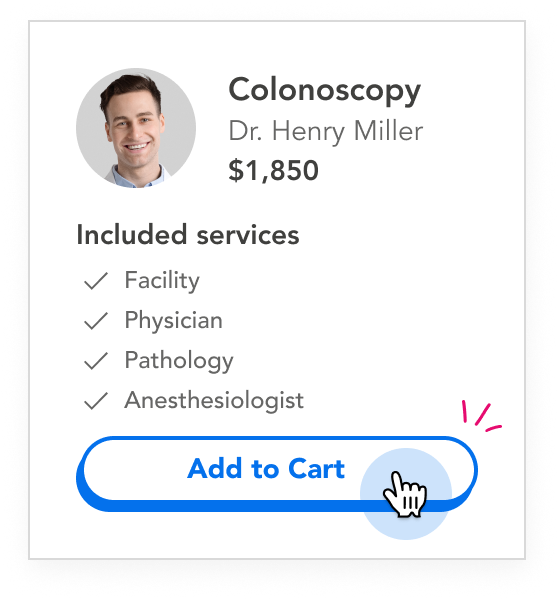HIDA Scan (Hepatobiliary Imaging) in the Oklahoma City Region
Save by purchasing this procedure online.
National Average 1,511
Regional Average935Save $576
Financing Options
Promotional financing available when you pay with CareCredit. $200 minimum purchase. What is CareCredit?
SSM Health St Anthony Hospital - Midwest
Nuclear Medicine
2825 Parklawn Drive
Oklahoma City, OK 73110
Offered by

Norman Regional Hospital
Nuclear Medicine
3300 HealthPlex Parkway
Norman, OK 73072
Offered by

Money Back Guarantee
We will refund your payment in full if you end up not needing your purchased procedure and do not receive care. Details
Get Care In Three Easy Steps
Compare Upfront Prices

Search by procedure and location to browse local providers and compare upfront pricing.
Buy Your Procedure

Pay for your procedure online or by calling (844) 256-7696. Or buy your procedure at the facility before your appointment is scheduled.
Receive Your Care

Follow the scheduling instructions given by your provider. Bring your voucher to your appointment.
Frequently Asked Questions
View All FAQsHIDA Scan (Hepatobiliary Imaging) Cost in the Oklahoma City Region
Save by purchasing this procedure online.
Procedure Details
What is a HIDA Scan?
A HIDA scan, also known as a hepatobiliary scan or a hepatobiliary scintigraphy, is an imaging procedure most often used to evaluate gallbladder function, but may also be used to diagnose gallbladder conditions like acute cholecystitis or other problems with the liver and bile ducts.1 The scan monitors the flow of bile from the liver to the small intestine.2
To track bile flow, small amounts of a radioactive tracer are injected into a vein in your arm, most often via an IV line. The tracer moves through the bloodstream to the liver, where it is absorbed by bile-producing cells. A gamma camera (specialized nuclear medicine camera) records the flow of the bile as it moves through your body and generates computer images of the organs as the tracer travels through them.3
The tracers used in nuclear medicine use no more radiation than routine chest x-rays or CT scans.4
What Can You Expect During a HIDA Scan?
Before Your Scan
- You will most likely be asked to fast for four to six hours before your scan.
- You may have to change into a hospital gown.
- Be sure to follow all of your doctor’s instructions about medicines before your scan, especially if you take pain medicine derived from morphine.5
During Your Scan
- You will be asked to lay on a table while the tracer is injected.
- Depending on the purpose of your hepatobiliary scan, you may receive another injection to make your gallbladder contract or to make it more visible.
- You will need to hold still while the gamma camera collects images, which typically takes about an hour.
- If additional images are needed, you may be asked to repeat the scan within 24 hours of the original. 6
What are the Risks?
Hepatobiliary scans typically have very few side effects. Be sure to tell your doctor if you are pregnant, might be pregnant, or are breastfeeding. Nuclear medicine scans are typically not performed on pregnant women to avoid risk to the baby.7
- Allergic reaction to injections
- Bruises at the injection site
- Small exposure to radiation
What is a HIDA Scan Used For?
This scan is often used to evaluate how well your gallbladder is working, and diagnose conditions of the gallbladder, liver, and bile ducts. Some medical conditions or tests that may require a hepatobiliary scan include:9
- Cholecystitis (gallbladder inflammation)
- Bile duct obstruction
- Leaks or fistulas
- Bile duct abnormalities
- Assessment after liver transplant
- Assessment of gallbladder ejection fraction (rate at which the gallbladder releases bile)10
1 Mayo Clinic Staff. “HIDA Scan.” Jan. 6, 2018. https://www.mayoclinic.org/tests-procedures/hida-scan/about/pac-20384701
2, 5, 6, 7, 8, 9, 10 Cleveland Clinic. “HIDA Scan.” https://my.clevelandclinic.org/health/diagnostics/17099-hida-scan
3 Mayo Clinic. “HIDA Scan.”
4 National Institute of Biomedical Imaging and Bioengineering. “Nuclear Medicine.” Science Education. July 2016. https://www.nibib.nih.gov/science-education/science-topics/nuclear-medicine
Patient Reviews
5.0
What did you like most about using MDsave?
It's easy
What could we do to improve?
Nothing that I know of
What did you like most about using MDsave?
Saving
What could we do to improve?
No idea
What did you like most about using MDsave?
quick easy and saved me money
What could we do to improve?
Oregon is new to MD saves you might suggest going to appointment a little early due to that
What did you like most about using MDsave?
Savings
What could we do to improve?
Your all good
What did you like most about using MDsave?
Took care of my bill.
What could we do to improve?
Nothing
Procedures
© Copyright 2025 MDsave Incorporated.
All Rights Reserved.



